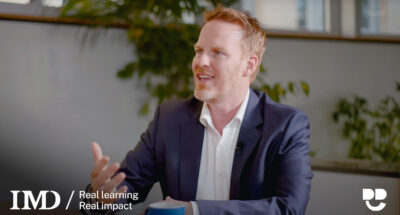
How does sustainable leadership work?
This episode takes you behind the scenes of a recent gathering led by the World Business Council for Sustainable Development together with IMD, where David Bach sat down with two sustainability leaders....

by Natalia Olynec Published March 21, 2025 in Sustainability • 6 min read
Corporate leadership is facing profound challenges driven by economic, political, and regulatory pressures. Changing European Union regulations, trade wars, and escalating geopolitical uncertainties are reshaping global business. Amid these headwinds, strong sustainability leadership is emerging as a key driver of business growth and resilience.
That’s why the role of the chief sustainability officer (CSO) is evolving to become a driver of long-term value. Here, I outline six fundamental shifts:
For years, CSOs served as the moral compass of organizations, advocating for sustainability without necessarily having the power or resources to execute. Today, companies expect CSOs to lead implementation. Increasingly, according to a recent Spencer Stuart study, they are embedding sustainability into corporate strategy, operations, and governance.
This shift is driven by heightened regulatory pressures, investor demands, and a growing recognition that sustainability fosters innovation and competitive advantage. Companies like Schneider Electric exemplify this shift. The French firm, which creates software and services for energy management, integrates sustainability into its core operations, ranking at the top of TIME magazine’s list of the world’s most sustainable companies. It has set ambitious emission reduction targets, employs rigorous tracking methodologies, and has earned an “A” climate score from the Climate Disclosure Project for more than a decade.
Deep business knowledge is crucial to a CSO’s success. Schneider Electric’s appointment of Chris Leong as CSO in 2025 reflects this. Her career within the company spans multiple executive roles, including Chief Marketing Officer and Executive Vice President of Digital Customer Experience.
“Sustainability is our North Star, encouraging us to question the status quo and unleash innovative ideas,” she explains. “By turning ambitions into actions, we relentlessly pursue energy efficiency, automation, and digitization innovations that make a difference.”
One of the biggest challenges CSOs face is managing tradeoffs between commercial value creation and the growing burden of sustainability reporting. While regulatory frameworks like the EU’s Corporate Sustainability Reporting Directive (CSRD) increase transparency, they also demand significant resources. According to a 2025 report by the Weinreb Group, 90% of CSOs say they are spending more time on compliance than two years ago. While sustainability reporting is essential, it should not come at the expense of meaningful strategic action. Companies that successfully navigate this balance use data-driven insights to enhance regulatory compliance and business strategy.

“Their role is shifting from merely ensuring compliance to driving innovation and systemic change.”
CSOs now play a central role in cross-functional collaboration, engaging finance, supply chain, legal, and HR teams, as well as board committees. Their role is shifting from merely ensuring compliance to driving innovation and systemic change.
Requirements for double materiality assessments, climate risk management, and human rights due diligence provide a foundation for deeper strategic integration, according to BSR. Industries like manufacturing, consumer goods, and technology are identifying where sustainability risks and opportunities directly impact business models.
As sustainability gains strategic prominence, CSOs increasingly oversee issues beyond their original scope – from climate action and circular economy initiatives to diversity, equity, and inclusion (DE&I). While these areas are interconnected, an expanding mandate risks diluting focus. Without clear priorities, CSOs risk becoming overwhelmed, reducing their effectiveness. Companies must ensure sustainability remains strategic and focused on material topics rather than reactive.

Sustainability is no longer a politically neutral issue. CSOs must navigate a polarized landscape, particularly in regions where climate action and DE&I initiatives face opposition.
For example, businesses operating in the US face ESG-related pushback – and potential legal action – while European firms contend with stringent regulations. Successfully balancing these pressures requires strategic engagement with policymakers, investors, and the public.
Blackrock, Goldman Sachs, Wells Fargo, JPMorgan Chase, Bank of America, Citigroup, and Morgan Stanley recently backed out of the Net Zero banking alliance, a global financial network supporting net-zero carbon emissions by 2050.
Some CSOs are avoiding overly political or jargon-laden language. Instead, they use more human-centered language to discuss sustainability, helping to neutralize political backlash and keep the focus on long‑term value creation. Chief Executives for Corporate Purpose (CECP), a CEO-led coalition of over 200 businesses, has created a toolkit with suggestions such as, “our people, not social human capital”, “long-term success, not sustainability”, and “responsible leadership, not governance.” The idea is to ensure sustainability is synonymous with being future-ready, creating efficiencies, and uncovering opportunities.
Many, like Karen Pflug, Chief Sustainability Officer at Ingka Group (IKEA’s holding company), actively engage with government, advocating for policies like the EU’s Circular Economy Act to transform waste management and production practices and help meet the firm’s circular ambitions.
“This initiative has the potential to reframe waste as a valuable resource and strengthen the EU’s recycling industry,” she explains. She also supports harmonized Extended Producer Responsibility (EPR) schemes to improve recycling rates and reduce landfill dependency.
CSOs are also increasingly involved in enterprise risk management. Geopolitical tensions, supply chain disruptions, and evolving regulations create uncertainty that directly impacts sustainability strategies. The COVID-19 pandemic and the Russian invasion of Ukraine exposed the fragility of global supply chains, pushing companies to rethink sourcing strategies, energy dependencies, and material inputs.
By working closely with CFOs and COOs, CSOs ensure that sustainability strategies enhance business continuity and resilience.
The CSO role has shifted from advocacy to execution, from siloed responsibility to cross-functional integration.
As sustainability becomes fully embedded in corporate functions, some experts predict the CSO role may eventually be phased out and integrated with traditional C-suite positions such as CFO or COO. Some companies do not replace the departing CSO once its initial “builder” phase is complete, according to Weinreb. However, for now, the role remains critical for many firms. Emerging titles like Chief Impact Officer and Chief ESG Officer signal a refinement rather than an elimination of sustainability leadership.
The CSO role has shifted from advocacy to execution, from siloed responsibility to cross-functional integration. To succeed, today’s CSOs must be both strategists and implementers – balancing regulatory compliance with business value creation. Companies that empower CSOs with decision-making authority, budget, and cross-functional influence will be best positioned for the future.
Sustainability professionals need a broad skill set.
Technical expertise – carbon accounting, ESG reporting, and circular economy models – is essential but not enough to drive real change. The biggest obstacles to sustainability are human, not technical. Resistance to change, competing priorities, and organizational silos often stand in the way.
Three ways to overcome resistance to change
Sustainability professionals need a broad skill set. More than technical experts, they must be adaptable and reflective leaders who can work across functions and industries while managing diverse stakeholders.
The future belongs to those who can translate complex sustainability issues into compelling business cases, navigate resistance, and drive cultural change. Companies that excel in this will not only meet sustainability targets but also redefine what it means to be a resilient, future-ready business.

Chief Sustainability Officer at IMD
Natalia is the Chief Sustainability Officer at IMD. She designs and implements sustainability strategy, develops executive education programs and advisory, publishes research, builds cross-sector partnerships, and communicates IMD’s ambitions and progress. The Center for Sustainable and Inclusive Business, co-led by Olynec, aims to support leaders and companies to take steps towards a more sustainable and inclusive business world by harnessing IMD’s knowledge and expertise in this field and offering tools to help them deliver systemic, innovative, and impactful responses.

April 17, 2025 • by David Bach, Felix Zeltner in Sustainability
This episode takes you behind the scenes of a recent gathering led by the World Business Council for Sustainable Development together with IMD, where David Bach sat down with two sustainability leaders....

April 16, 2025 • by Benoit F. Leleux in Sustainability
How a private equity-backed corporate carve-out created a successful, sustainable consulting powerhouse...

April 14, 2025 • by Salvatore Cantale, Frederikke Due Olsen in Sustainability
By managing ESG-heavy assets separately, companies can drive progress in their sustainable business units while addressing the sustainability challenges of traditional assets. Here are four effective strategies to achieve your goals....
 Audio available
Audio available
April 8, 2025 • by Andrew J. Hoffman in Sustainability
Business schools must cultivate leaders who see beyond profits and embrace business as a powerful force for societal good....